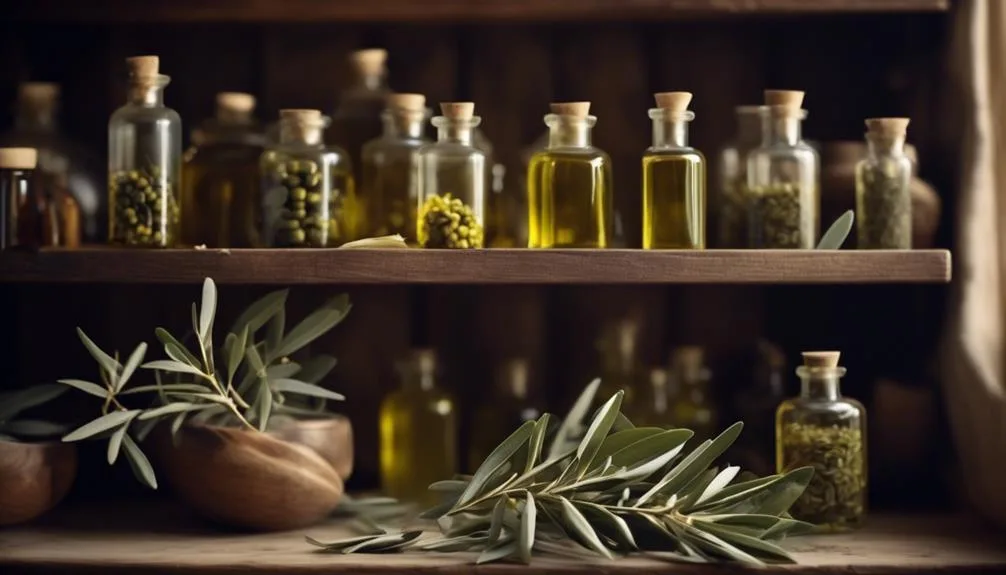For centuries, people have used olive trees in traditional remedies for various purposes. These ancient practices range from treating skin issues to aiding digestion.
But do these remedies actually work? By exploring the historical use, medicinal properties, and modern applications of olive trees in traditional remedies, we can gain valuable insights into their potential healing properties.
This article will provide a wealth of information to reshape your perspective on the olive tree's role in traditional medicine.
Key Takeaways
- Olive trees have a long history of use in traditional remedies, dating back to ancient civilizations such as the Egyptians, Greeks, and Romans.
- The medicinal properties of olive leaves and olive oil, such as their antioxidant and anti-inflammatory effects, make them valuable in traditional remedies.
- Traditional remedies using olive tree products include olive leaf extract for immune support, olive oil infusions for skincare and hair health, and olive tree bark tea for reducing inflammation and supporting cardiovascular health.
- While olive trees have adaptability in modern health and wellness practices, precautions should be taken, and consultation with a healthcare professional is advisable to ensure safe and effective use.
Historical Use of Olive Trees in Remedies
Throughout history, people have turned to the olive tree for its medicinal properties in treating various ailments and promoting overall well-being. The historical significance of olive trees in traditional remedies dates back thousands of years, with cultures such as the ancient Egyptians, Greeks, and Romans utilizing olive oil for its healing properties.
Olive trees have been an integral part of cultural practices, from being a symbol of peace and purity to being used in religious ceremonies and rituals. The use of olive leaves, fruits, and oil in traditional remedies has been documented in historical texts and has been passed down through generations.
The olive tree's significance in traditional remedies not only highlights its therapeutic value but also its enduring presence in various cultural practices around the world.
Medicinal Properties of Olive Trees
The historical use of olive trees in traditional remedies sets the stage for understanding the remarkable medicinal properties of these ancient trees.
The olive tree, with its rich cultural significance, has been revered for centuries for its medicinal benefits. Olive leaves and olive oil are known for their potent antioxidant and anti-inflammatory properties.
The leaves have been traditionally used to treat various ailments, such as fever, infections, and digestive issues. Olive oil, a staple in Mediterranean cuisine, isn't only a healthy dietary fat but has also been used topically to soothe and heal the skin.
Furthermore, the olive tree's extracts are being studied for their potential in managing chronic conditions like diabetes and cardiovascular diseases.
The medicinal properties of olive trees continue to be a fascinating area of research, shedding light on the ancient wisdom of traditional remedies.
Traditional Remedies Involving Olive Trees
In traditional remedies, olive trees have been utilized for their medicinal properties for centuries, offering natural solutions for various health concerns. The olive tree holds significant cultural importance and has been a symbol of peace, purity, and fertility in many cultures.
Here are three traditional remedies involving olive trees:
- Olive Leaf Extract: Used in ancient Egyptian and Mediterranean cultures, it's believed to have antibacterial and antioxidant properties, aiding in immune support and overall wellness.
- Olive Oil Infusions: Olive oil infused with herbs from the olive tree is used in traditional medicine to alleviate skin conditions, soothe muscle pain, and promote hair and scalp health.
- Olive Tree Bark Tea: Utilized in traditional Greek and Roman medicine for its potential to reduce inflammation, support cardiovascular health, and provide digestive relief.
The olive tree folklore and its cultural significance have contributed to its enduring use in traditional remedies.
Modern Applications of Olive Trees in Remedies
Modern applications of olive trees in remedies continue to demonstrate their versatility and effectiveness in addressing various health and wellness needs. Olive oil, a key product derived from olive trees, is widely used in cosmetic formulations for skincare due to its hydrating and antioxidant properties. Additionally, it is a staple in culinary applications, enhancing cooking techniques and providing health benefits. The table below outlines the modern applications of olive trees in remedies.
| Category | Application | Benefits |
|---|---|---|
| Cosmetic uses | Skincare | Hydrating, antioxidant properties |
| Culinary | Cooking techniques | Enhances flavors, provides health benefits |
Olive trees are not only valued for their historical significance in traditional remedies but also for their adaptability in modern health and wellness practices.
Precautions and Considerations for Using Olive Trees in Traditional Remedies
Considering precautions and potential risks when using olive trees in traditional remedies is essential to ensure safe and effective application. Here are some important factors to keep in mind:
- Preparation methods: Be sure to follow proper preparation methods when using olive trees in traditional remedies. This includes knowing the correct parts of the tree to use, as well as the appropriate dosage and administration methods.
- Potential risks: While olive trees have many beneficial properties, there are potential risks associated with their use in traditional remedies. It's crucial to be aware of any potential allergic reactions, drug interactions, or side effects that may occur.
- Consultation: Before using olive trees in traditional remedies, it's advisable to consult with a healthcare professional, particularly if you have any underlying health conditions or are taking medications.
Conclusion
To sum up, the rich history of utilizing olive trees in traditional remedies spans centuries, and their healing properties remain highly regarded today.
Whether used for skincare or overall well-being, olive trees offer diverse benefits through their oil, leaves, and bark.
It's important to approach their use with caution, seeking guidance from a healthcare professional.
The enduring significance of olive tree remedies prompts us to appreciate the wisdom of ancient traditions and consider their relevance in modern wellness practices.

